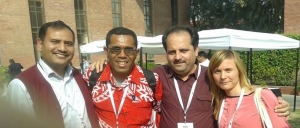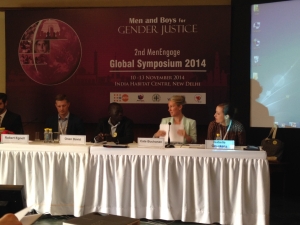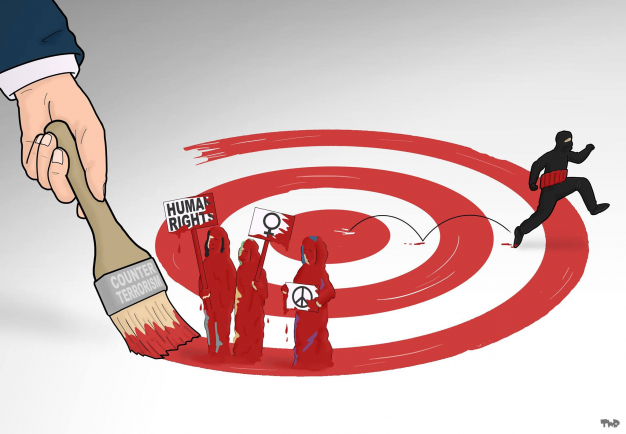“Redefining peace and security from a holistic gender perspective means integrating a masculinities perspective in the Women, Peace and Security agenda. This uncovers the gendered roots of armed conflict, and highlights the need to develop nonviolent responses and interventions accordingly” – Isabelle Geuskens
 During November 10-13, WPP staff attended the 2nd MenEngage Global Symposium “Men and Boys for Gender Justice” in New Delhi, India. At the symposium, which brought over 1000 men and women working on gender justice on local, national and international level together, WPP staff (re-) connected with many male and female activists working for gender-sensitive peacebuilding. WPP staff met several former trainees of the pioneering WPP Training of Trainers (ToT) Cycle “Overcoming Violence: Exploring Masculinities, Violence and Peace” (2009-2010) – the first ToT focusing on integrating a masculinities perspective in Gender-Sensitive Active Nonviolence – who have since been organizing many trainings on the same topic. In addition, some former trainees are currently national focal points of MenEngage. At the symposium, WPP advocated for a transformative gender approach in peacebuilding, including adequate accountability processes, to enable men and women working as partners for sustainable peace.
During November 10-13, WPP staff attended the 2nd MenEngage Global Symposium “Men and Boys for Gender Justice” in New Delhi, India. At the symposium, which brought over 1000 men and women working on gender justice on local, national and international level together, WPP staff (re-) connected with many male and female activists working for gender-sensitive peacebuilding. WPP staff met several former trainees of the pioneering WPP Training of Trainers (ToT) Cycle “Overcoming Violence: Exploring Masculinities, Violence and Peace” (2009-2010) – the first ToT focusing on integrating a masculinities perspective in Gender-Sensitive Active Nonviolence – who have since been organizing many trainings on the same topic. In addition, some former trainees are currently national focal points of MenEngage. At the symposium, WPP advocated for a transformative gender approach in peacebuilding, including adequate accountability processes, to enable men and women working as partners for sustainable peace.
 As such, on November 11th, Isabelle Geuskens, WPP Executive Director, participated in the panel discussion “Masculinities and the Making of Peace and Violence”. In this panel discussion, she highlighted that a masculinities perspective in gender-sensitive peacebuilding is essential, as well as investing in nonviolent alternatives for addressing conflict. In her speech, she shared insights and lessons learned of WPP’s pioneering work on integrating a masculinities perspective for a transformative Women, Peace and Security agenda. Building upon insights gathered at the WPP Global Consultation on Masculinities in 2013 and the WPP Global Consultation on Gender & Militarism in 2014, she emphasized that just adding women to the existing peace & security system is not enough; through a critical masculinities perspective the peace & security system can be transformed to more preventive and nonviolent interventions, enabling women and men to actively participate in conflict resolution processes.
As such, on November 11th, Isabelle Geuskens, WPP Executive Director, participated in the panel discussion “Masculinities and the Making of Peace and Violence”. In this panel discussion, she highlighted that a masculinities perspective in gender-sensitive peacebuilding is essential, as well as investing in nonviolent alternatives for addressing conflict. In her speech, she shared insights and lessons learned of WPP’s pioneering work on integrating a masculinities perspective for a transformative Women, Peace and Security agenda. Building upon insights gathered at the WPP Global Consultation on Masculinities in 2013 and the WPP Global Consultation on Gender & Militarism in 2014, she emphasized that just adding women to the existing peace & security system is not enough; through a critical masculinities perspective the peace & security system can be transformed to more preventive and nonviolent interventions, enabling women and men to actively participate in conflict resolution processes.
On the last day, Isabelle Geuskens moderated the panel discussion on Gender, Peace and Militarism. During the panel discussion, the panelists delved deeper into the connections between masculinities, violence and militarism and the risks of gender labeling, with the women seen as more peaceful and men as violent. Such a narrow view impedes sustainable peacebuilding process, where both men and women will have the feeling not being recognized. With case studies from conflict and post-conflict countries, from El Salvador to South Asia, it became clear that a thorough holistic gender analysis is needed, with balanced attention for the experiences of both men and women during armed conflict, in order to address militarism and create sustainable peace. The panelists concluded that Women, Peace and Security has been narrowed down to just adding women to the military. There is a lack of challenging of militarization in itself as a cause of war and armed conflict. Panelists found that the Women, Peace and Security agenda is currently about 'making war more safe', and not enough about preventing war.
Based on the discussion at the symposium, MenEngage issued a Delhi Declaration and Call to Action, containing 10 concerns and affirmations and examples to address gender justice gaps. Amongst others, the declaration emphasizes that “[t]he Post-2015 Development Agenda must embrace a human rights approach and also transform unequal power relations.”. Read the Delhi Declaration and Call to Action. More information about the MenEngage Symposium, including pictures and video’s can be found on this website.
11 Dec '17 This month WPP staff interviewed Arbia Jebali and Sarah Chamekh from Free Sight Association in Tunisia about the work their organization does, how civil society space has changed over the years, which challenges they are facing now, and how civil society in Tunisia is organizing itself to overcome those challenges.
7 Nov '17 In this article, WPP staff interviewed Doron Joles of XminY Fund, an activist organization that supports social movements, action groups and changemakers fighting for a fair, democratic, sustainable and accepting world. He discusses the unique way they have chosen to hand out funds, and the challenges that go along with funding small activist organizations in the current global climate.

25 Oct '17 This Friday, the UNSCR 1325 Open Debate will take place once again, seventeen years since the adoption of landmark UN Security Council Resolution 1325 on Women, Peace and Security. In this article WPP staff reflects on the progress made for a truly transformative feminist peace agenda until now.
